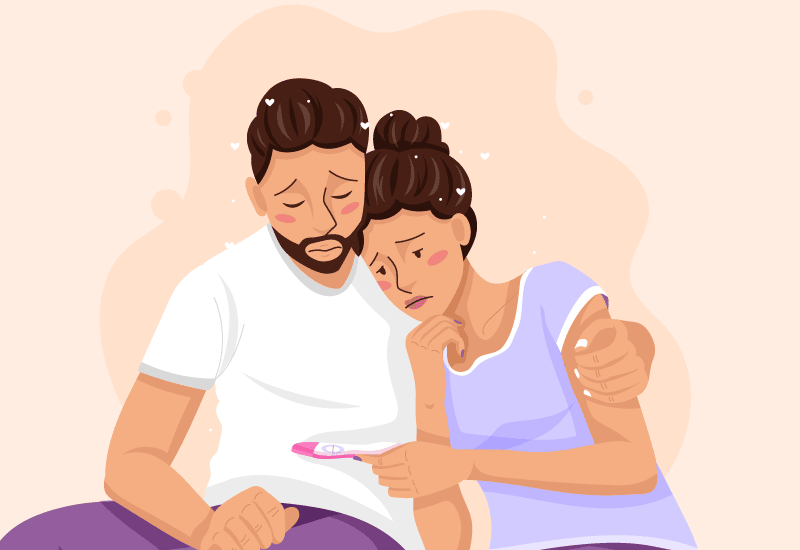Infertility
Infertility is a condition of the male or female reproductive system described by the failure to achieve pregnancy after 12 months or more of frequent unprotected sexual intercourse.

Description:
Pregnancy requires a number of steps: 1.The reproductive hormones that regulate ovarian function are produced by your brain. 2.Your ovary must mature an egg. 3.An egg must be released by your ovary (ovulation). 4.The egg needs to be picked up by your fallopian tube. 5.To reach your fallopian tube sperm must pass via your uterus and up your vagina. 6.An embryo is created when the sperm fertilizes the egg. 7.The embryo enters your uterus through your fallopian tube and implants there. If something doesn't happen during this procedure, a pregnancy can't happen. Millions of people struggle with infertility, which also impacts their families and communities. An estimated one in six individuals globally who are of reproductive age will, at some point in their lives, become infertile. Types: Infertility can be classified into the following types: 1.Primary infertility occurs when you have never been pregnant and are unable to conceive after one year (or six months if you are 35 or older) of frequent unprotected sexual contact. 2.Secondary infertility occurs when you are unable to conceive after having at least one successful pregnancy. 3.Unexplained infertility: No medical condition has been identified by fertility testing as the cause of an individual's or couple's infertility.
Cause:
Numerous issues with either the male or female reproductive systems can lead to infertility. Twenty-five percent of infertile couples attribute their infertility to multiple contributing factors. Infertility in the female reproductive system can result from: •Sexually transmitted infections (STIs) or complications from unsafe abortions postpartum sepsis or abdominal/pelvic surgery can lead to tubal disorders like blocked fallopian tubes; •Uterine disorders can be inflammatory (like endometriosis), congenital (like septate uterus), or benign (like fibroids); •Disorders of the ovaries, including polycystic ovarian syndrome and other follicular disorders; •Hormone imbalances related to reproduction caused by endocrine system diseases. The pituitary glands and the hypothalamus are parts of the endocrine system. Common conditions that impact this system include hypopituitarism and pituitary tumors. Infertility in the male reproductive system can result from: •Abnormalities in the ejection of semen due to blockage of the reproductive tract. The tubes that convey semen such as the seminal vesicles and ejaculatory ducts, may become clogged. Genital tract infections or traumas are frequently the cause of blockages. •Hormonal diseases that result in abnormalities in the hormones that the testicles hypothalamus and pituitary gland generate. The generation of sperm is regulated by hormones like testosterone. Disorders such as pituitary or testicular tumors can cause an imbalance in hormones. •Failure of the testicles to generate sperm for instance, as a result of varicoceles or medical interventions that damage the cells that create sperm (such chemotherapy). •Poor quality and function of sperm. Fertility is adversely affected by circumstances or events that result in abnormal sperm morphology and motility. For example, the usage of anabolic steroids might result in abnormal sperm parameters such as sperm count and shape. Fertility can be impacted by lifestyle choices like obesity smoking and excessive drinking. Furthermore, gametes (eggs and sperm) may be directly toxicized by exposure to pollutants and chemicals in the environment, which could lead to a decline in their quantity and quality.
Symptom:
The main indicator of infertility is being unable to get pregnant after six months or a year of regular unprotected intercourse. You might not have any other symptoms. However, some individuals may have bodily signs like: • Abdominal or pelvic discomfort. • Irregular periods irregular vaginal bleeding or no periods at all. • Problems with penile function or ejaculation.
Ayurveda Treartments:
Snehanam Swedanam Nasyam Virechanam Uttaravasti Lepanam Navara pinda swedanam Yoni pichu
Naturopathy Treartments:
Hip bath Spinal spray Immersion bath Enema Steam bath Mud therapy Pelvic Packs Reflexology Acupuncture Manipulative therapy Diet therapy Clinical yoga
